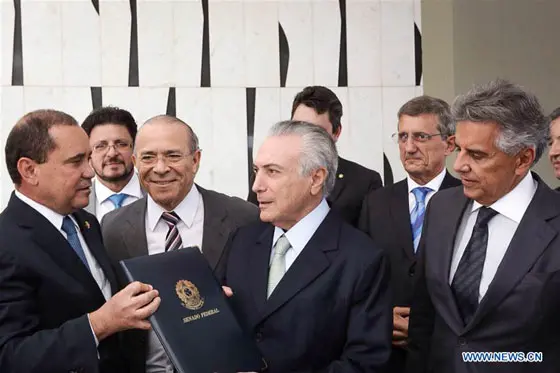Brazil's interim government has concluded its first month in power with a cascade of scandals, which may undermine its reform plans and increase the suspended President Dilma Rousseff's chances of returning to power.
Interim President Michel Temer of the center-right Brazilian Democratic Movement Party (PMDB) was designated to take over on May 12, after Rousseff, of the left-leaning Workers' Party (PT), was suspended from the presidency pending an impeachment trial.
While Rousseff was sidelined for the alleged window-dressing of fiscal accounts to make the public deficit look smaller, which she has denied, Temer is experiencing a deeper credibility crisis as his cabinet members face allegations of more serious crimes, including embezzling public funds.
Temer's Minister of Planning Romero Juca, who is also head of the PMDB, was forced to step down last month after leaked tapes indicated he voted in favor of impeaching Rousseff to stop a corruption investigation involving him and other politicians.
Political scientist Claudio Couto of the Getulio Vargas Foundation (FGV) noted that in recent weeks Operation Car Wash -- an investigation into graft at state oil giant Petrobras -- has implicated more members of the PMDB and its allied Progressive Party (PP) than members of the PT.
Couto said the power shift was in essence removing the middlemen of corruption and "giving power directly to the ultimate interest groups."
The scandals, among others, appeared to have terminated the honeymoon period of the new governing party before it even began.
The first poll taken since Temer was installed as the interim president showed less than 12 percent of Brazilians approve of his government, and that 50 percent want the 2018 presidential elections to be advanced.
Some 75 percent of Brazilians believe that corruption will continue or get worse under Temer.
On Friday, thousands of protesters took to the streets in major cities to demand Temer's ouster, and more protests have been predicted for the new government in the coming months.
The low public support forebodes a hard time for Temer's government in convincing Congress to approve economic measures to lower the budget deficit, its main mandate.
"The government may find it difficult to get support for proposals such as constitutional amendments to establish a ceiling on public spending that might affect education, health and retirement," Couto said.
The Senate is expected to conclude the impeachment trial by mid-August, and while the turnout is yet unpredictable, several senators who had voted in favor of trying Rousseff, such as former Education Minister Cristovam Buarque, later expressed doubts over her guilt.
(APD)
 简体中文
简体中文

